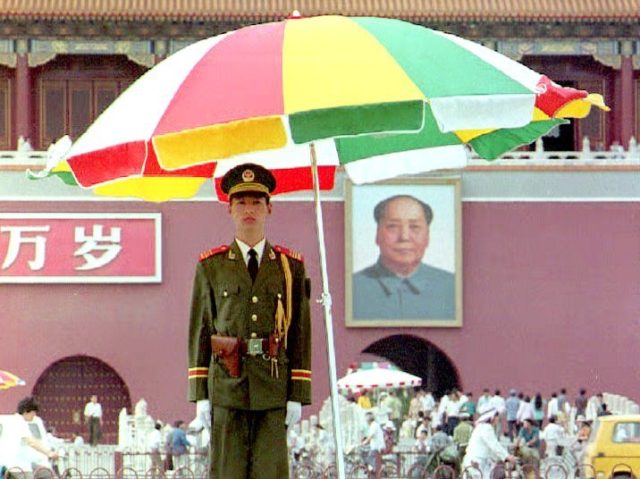China’s defense minister, General Wei Fenghe, told an audience in Singapore Sunday that the Tiananmen Square massacre – the brutal crackdown of anti-communist protests in Beijing in 1989 – was a “correct policy” and credited the mass murder with bringing “stability and development” to the country.
China has spent decades attempting to fully censor the incident and has never allowed estimates on the number killed or imprisoned. Experts believe Chinese Communist Party police and soldiers killed hundreds, if not thousands, of protesters demanding liberal democracy, inspired by the impending fall of the Soviet Union and similar protests nationwide. Until this year, China had largely ignored the anniversary of the protests, censoring all mention of it on the Chinese internet.
In a sign of potentially admitting defeat – or being comfortable enough with its repression to not fear inspiring outrage – Wei answered a question about Tiananmen, defending the incident, and China’s state-run newspaper Global Times published an article celebrating the “incident.”
Wei spoke at the Shangri-La Dialogue, a global defense forum.
“That incident was a political turbulence and the central government took measures to stop the turbulence which is a correct policy,” he said in response to a question about the anniversary of the massacre. “The 30 years have proven that China has undergone major changes China has enjoyed stability and development.”
Wei reportedly questioned why the world frowned upon China killing hundreds of its citizens, according to Agence France-Presse, and recommended that critics “visit China” to “better understand” why the Communist Party chose the mode of action it did.
China has invested years of time and energy into erasing the Tiananmen Square massacre. Extensive censorship online redirects or blocks searches for the event, schools do not teach it, and commemorating those killed in public could lead to severe police retribution. Chinese officials closely monitor social media to preemptively block any content educating readers about the killings. As of 2015, only 15 of 100 students surveyed could identify the photo known as “tank man” – the iconic image of a Chinese protester standing in front of a tank in Tiananmen Square. China has never allowed the public to identify the man or revealed his fate.
This year, however, the Chinese Communist Party is going on the offensive, claiming the crackdown was necessary to preserve communism and only enemies of the Chinese state support such popular uprisings. In addition to Wei’s comments, the Global Times published an editorial Sunday defending the killings and their subsequent censorship.
“We consider such practice a political success, although some people have criticized it from the perspective of news governance. Merely afflicting China once, the incident has not become a long-term nightmare for the country,” the Times claimed. “Neither has the incident’s anniversary ever been placed in the teeth of the storm. It has become a faded historical event, rather than an actual entanglement.”
The Times column goes on to praise China for being too “mature” to have a repeat of the protests and state that the incident was a “vaccination” for China against “major political turmoil.”
In addition to the Tiananmen Square killings, Wei defended the modern use of concentration camps to torture and enslave the nation’s Uighur, Kazakh, and Kyrgyz Muslim minorities. The Pentagon estimates that China has imprisoned as many as 3 million people in the camps, where they are forced to memorize communist propaganda songs, learn Mandarin, worship Communist Party leader Xi Jinping, and make cheap clothing in sweatshops.
Chinese officials call the camps “vocational training centers,” claiming that they send individuals there to learn skills necessary to be competitive in the Chinese economy. Without that training, authorities claim, Muslims are naturally susceptible to joining jihadist groups. Relatives of the imprisoned say many are highly educated, held stable jobs, and had no need for such training before being imprisoned.
“China’s policy in Xinjiang is absolutely right,” Wei said in Singapore. “Vocational education ensures there are no terrorist attacks … Over the past more than two years there has not been a single terrorist attack in Xinjiang.”
Wei also addressed China’s growing belligerence against Taiwan and threatened military action to colonize it.
“The Taiwan question bears on China’s sovereignty and territorial integrity. Not a single country in the world would tolerate secession,” Wei said. “I visited the US last year. American friends told me that Abraham Lincoln was the greatest American president because he led the country to victory in the Civil War and prevented the secession of the US. The US is indivisible, so is China. China must be and will be reunified. We find no excuse not to do so.”
“If anyone dares to split Taiwan from China,” he warned, “the Chinese military has no choice but to fight at all costs for national unity.”
Taiwan has been a sovereign state operation outside of Beijing’s control since 1945.

COMMENTS
Please let us know if you're having issues with commenting.